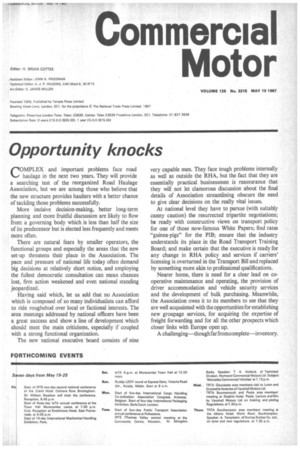Opportunity knocks
Page 23

If you've noticed an error in this article please click here to report it so we can fix it.
COMPLEX and important problems face road haulage in the next two years. They will provide a searching test of the reorganized Road Haulage Association, but we are among those who believe that the new structure provides hauliers with a better chance of tackling those problems successfully.
More incisive decision-making, better long-term planning and more fruitful discussion are likely to flow from a governing body which is less than half the size of its predecessor but is elected less frequently and meets more often.
There are natural fears by smaller operators, the functional groups and especially the areas that the new set-up threatens their place in the Association. The pace and pressure of national life today often demand big decisions at relatively short notice, and employing the fullest democratic consultation can mean chances lost, firm action weakened and even national standing jeopardized.
Having said which, let us add that no Association which is composed of so many individualists can afford to ride roughshod over local or factional interests. The area meetings addressed by national officers have been a great success and show a line of development which should meet the main criticisms, especially if coupled with a strong functional organization.
The new national executive board consists of nine very capable men. They face tough problems internally as well as outside the RHA, but the fact that they are essentially practical businessmen is reassurance that they will not let clamorous discussion about the final details of Association streamlining obscure the need to give clear decisions on the really vital issues.
At national level they have to pursue (with suitably canny caution) the resurrected tripartite negotiations; be ready with constructive views on transport policy for one of those now-famous White Papers; find rates "guinea-pigs" for the PM; ensure that the industry understands its place in the Road Transport Training Board; and make certain that the executive is ready for any change in RHA policy and services if carriers' licensing is overturned in the Transport Bill and replaced by something more akin to professional qualifications.
Nearer home, there is need for a clear lead on cooperative maintenance and operating, the provision of driver accommodation and vehicle security services and the development of bulk purchasing. Meanwhile, the Association owes it to its members to see that they are well acquainted with the opportunities for establishing new groupage services, for acquiring the expertise of freight forwarding and for all the other prospects which closer links with Europe open up.
A challenging—though far from complete—inventory.




















































































































